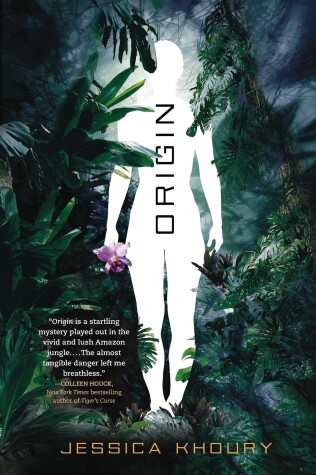Reviewed by Briana @ Pages Unbound on
Origin is an original debut novel that is on the forefront of the growing fad of genetic engineering but combines the science with a bit of magic. Readers’ reactions to this approach, however, will probably vary until they figure out it is the intended approach.
When the novel opens, the impression is that all will be based on cold scientific fact. So it is jarring when some of the science Khoury carefully explains to add realism to her novel is not quite sound. To start, the scientific community is truly convinced that Pia is immortal. In reality, what they know is that she has impenetrable skin, is very fast, and has lived for seventeen years. She may be immortal, but the use of the word is careless for a scientist. The facility also has immortal rats (i.e. They have rats that have lived a hundred years and who might still die.) Additionally, reactions in rats and humans may vary. Pia could die early or perhaps develop an adverse reaction to her “immortality.”
These details are, in some sense, trivial. Maybe the scientists got excited so they are using words loosely. The rest of their experimental procedures seem sound. The initial explanation of immortality process is, however, downright mystical, seemingly involving a magical flower and a mysterious process no one can properly explain. This is pretty mind-boggling upon first reading—until one continues reading and comes to understand that it is supposed to be mystical, that somehow science and magic are colliding in the book and there are things that can be explained by legend that cannot be explained by reason. Then, everything starts to fall wonderfully into place.
Pia slowly emerges from her cold scientific world into one based as much on the heart as on the head. Her teacher is Eio, an attractive boy from a nearby village, who is in turn loyal, courageous, vulnerable, and profound. No wonder Pia gets all swoony! He acts as companion, guide, and catalyst, and makes Origin as much a romance as it is science fiction.
His purpose is thus divided between winning Pia (and the reader?) over and showing her that there is more to life than can be seen with one’s eyes. He introduces the magic, as he introduces Pia to the villagers—who surprise her by knowing much more about immortality and its causes than her scientists do. Her struggle is to come to terms with the idea that the “ignorant” natives might have a lot of things to teach her, including things about the evil lurking in her own home.
Origin is intensely creative and manages to combine a number of genres with ease. The plot, the characters, and the ideas are strong, making it a fantastic debut.
Reading updates
- Started reading
- 27 October, 2012: Finished reading
- 27 October, 2012: Reviewed
